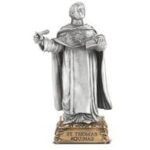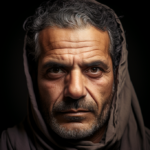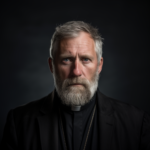
St. Albert the Great
St. Albert the Great
St. Albert the Great
When he lived:
St. Albert the Great lived from approximately 1193 to 1280.
Where he lived:
St. Albert the Great resided in various locations throughout his life, primarily in Germany. He was born in Lauingen, a small town in Bavaria, and spent his early years in the vicinity. Later, he pursued his education in Padua, Italy, and eventually settled in Cologne, Germany, where he taught and held important positions within the Catholic Church.
Notable world events during the time of his life:
- The Fourth Crusade (1202-1204): The Fourth Crusade, initiated by Pope Innocent III, aimed to reclaim Jerusalem from Muslim control. However, it deviated from its original goal, resulting in the sacking of Constantinople, the capital of the Byzantine Empire, in 1204. This event had far-reaching consequences for both the Christian and Byzantine worlds.
- The signing of the Magna Carta (1215): In 1215, King John of England reluctantly signed the Magna Carta, a groundbreaking document that established certain rights and limitations on the monarchy. It laid the foundation for constitutional law and influenced the development of democratic principles worldwide.
- The Mongol Empire (1206-1368): During St. Albert’s lifetime, the Mongol Empire, led by Genghis Khan and later his successors, rapidly expanded across Asia, Europe, and the Middle East. The empire’s conquests reshaped the political landscape, fostered cultural exchanges, and influenced future historical developments.
- The Renaissance (14th-17th centuries): While St. Albert lived toward the end of the Middle Ages, his era witnessed the beginnings of the Renaissance, a period marked by a renewed interest in art, science, and humanism. Intellectual advancements, artistic achievements, and cultural transformations were taking place in various parts of Europe.
His patronage:
St. Albert the Great is widely revered as the patron saint of scientists, philosophers, and theologians. His immense contributions to the fields of natural philosophy, theology, and education have made him an inspirational figure for those seeking knowledge, understanding, and intellectual pursuits. Additionally, he is often invoked by students, teachers, and scholars for guidance and wisdom in their studies and intellectual endeavors.
Early Life
Also known as Albert Magnus or Albert of Cologne, St. Albert was born sometime before 1200, and he died in 1280 in the Dominican convent in Cologne. Facts about his life aren’t well documented, so most areas make assumptions. The exact year of his birth is not known, but some sources claim that he was 87 years old at the time of his death. That is why 1193 is commonly given as his year of birth. He was probably born in Lauingen since he referred to himself as Albert of Lauingen, but there is also a probability that Lauingen could have just been his family name. There is also a probability that he came from a religious family.
His Work as a Lecturer
St. Albert probably attended the University of Padua, where he received instruction from Aristotle’s writings. He was a philosopher and Catholic friar from Germany who filled the position of a lecturer at Cologne in Germany, and he taught for several years there. During his first tenure as a lecturer, he wrote his Summa de Bono. In 1245, he became the master of theology under Geuric of Saint Quentin, who was the first German to achieve this distinction.
Following how things turned out, St. Albert went on to become a full-time professor at the University of Paris. While he was there, he made Aristotle’s writings accessible to broader academic debates by commenting on them. He also studied and commented on the teachings of Muslim academics, and this brought him into academic debate. He answered what he deemed to be the errors of the Islamic philosopher Averroes.

In 1254, he became provincial of the Dominican Order and fulfilled his duties satisfactorily. He publicly defended the Dominicans from attacks by the regular faculty of the University of Paris. In 1259, he took part in the general chapter of the Dominicans at Velenciennes with others, and they established a program of studies for the Dominicans. They made the study of philosophy an innovation for those not sufficiently trained to study theology.
In 1260, he was made bishop of Regensburg by Pope Alexander IV. He refused to ride on a horse and walked long distances on foot, thereby enhancing his reputation for humility. He became affectionately known as “Boots the Bishop.” After resigning in 1263, Pope Urban asked him to preach at the eighth crusade in the German-speaking countries.
His Contributions
St. Albert was the founder of Germany’s oldest university in Cologne, and he was also known as the mediator between conflicting parties. As someone who was a scientist, a theologian, a philosopher, an ecumenist, an astrologer, a spiritual writer, and a diplomat, he molded the curriculum of all Dominican students. During his time, he was known as “Doctor Universalis.” Some scholars even refer to him as the greatest German philosopher and theologian of the Middle Ages.
He had encyclopedic knowledge of topics such as logic, theology, botany,geography, astronomy, astrology, mineralogy, alchemy, zoology, music therapy, physiology, phrenology, justice, law, friendship, and love. and deeply studied and preserved Aristotle’s work. His knowledge of natural science was astonishingly accurate for his age. St. Albert invented entire special sciences where Aristotle had not covered a topic, and this knowledge of different fields earned him the title Doctor Universalis.
Some reports from years after his death claim that St. Albert was a magician, but that confusion was fueled by alchemical works that were falsely attributed to him in an attempt to increase prestige through association.
Legacy
The Catholic Church recognizes him as one of the 36 Doctors of the Church, and he is the patron saint of natural scientists, medical technicians, philosophers, and scientists. His feast day is on November 15.
His relics are in a Roman sarcophagus in St. Andreas Church in Cologne.
St. Albert was beatified in 1622 and canonized and proclaimed the Doctor of the Church on the 16th of December 1931.
He is credited with a Dominican habit, mitre, book, and quill. A number of schools have been named after him.
6 Interesting Facts About St. Albert the Great
- St. Albert is reported to have had an encounter with the Blessed
Virgin Mary, who convinced him to enter the Holy Order. - During his later days in life, St. Albert had the sobriquet Magnus.
appended to his name. - St. Albert was the first to comment on the works of Aristotle.
- St. Albert is responsible for “the big verdict,” which brought an
end to the conflict between the citizens of Cologne and the
archbishop. - St. Albert and Aquinas’ thirty years of work allowed for
Aristotle’s’ work should be in the Dominican schools’ curriculum. - He discovered the element arsenic.
Prayer to St. Albert the Great
Let us pray, O God, who did richly adorn St. Albert with your heavenly gifts and decorated him with all virtues, grant that, following in his footsteps, we may persevere in your service until death and securely obtain an everlasting reward. Through Jesus Christ, your Son, our Lord Amen.



